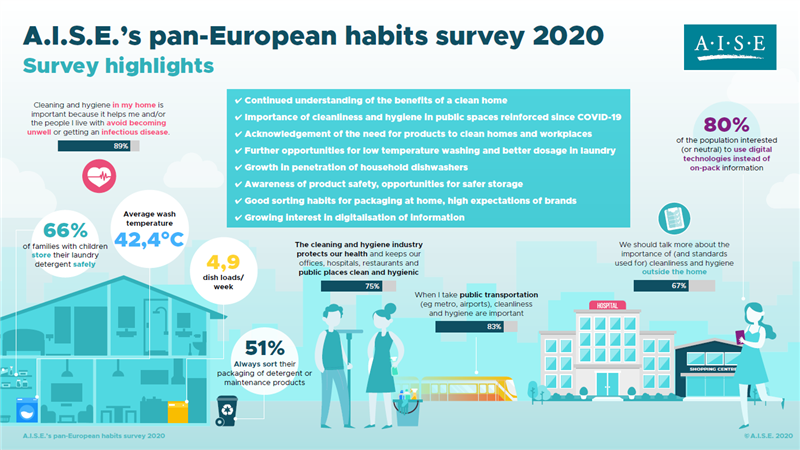Every three years since 2008, A.I.S.E. has commissioned a pan-European survey on citizens’ habits and perceptions. The objective of the research is to find out about perceptions vis-à-vis the cleaning and hygiene products industry, as well as to monitor habits and their evolution, in the domains of washing and cleaning as well as sustainability.
In 2020, the fieldwork for this research was in February (see methodology below). To establish whether and to what extent attitudes and understandings of cleanliness and hygiene may have changed during the COVID-19 pandemic, certain sections of the survey were re-run in June. These comparative results will be communicated in detail at a later stage.

Highlights from the survey findings
1. Cleanliness & hygiene at home: European citizens continue to understand and value the health and infection prevention benefits of a clean home
2. Cleanliness & hygiene outside the home: COVID-19 has reinforced that cleanliness and hygiene in public spaces (e.g. offices, shops, public transport, schools) are important to European citizens, and they are eager to learn more about professional cleaning standards
3. Cleaning & hygiene products industry: Consumers recognise the need for products to clean their homes and workplaces in a safe, efficient and effective manner
4. Laundry habits: Liquid detergents preferred and further opportunities for lower temperatures and better dosage
5. Dish care habits: The use of dishwashers in European households continues to grow as well as the number of loads
6. Safety and safe use: A general feeling that products are safe, but there are opportunities for more trust in EU legislation and safer storage habits
7. Product packaging: Overall, citizens have good sorting habits, but they also continue to expect a lot from brands
8. Product information and digitalisation: Citizens have a growing interest to move to online information, irrespective of their age
Research methodology
In 2020, this research was undertaken by the market research agency Insites Consulting for A.I.S.E.. The fieldwork was carried out in February. The survey was run through online questionnaires with >4500 persons in 23 countries in Western, Southern, Eastern Europe and Scandinavia. There were approximately 200 respondents per country and the recruitment via panel included both men and women, aged 18-65, who are responsible for the purchase and use of a washing machine. Benchmarking has been done with former studies to identify the evolution of trends.
Previous surveys
Download the summaries of the previous surveys: